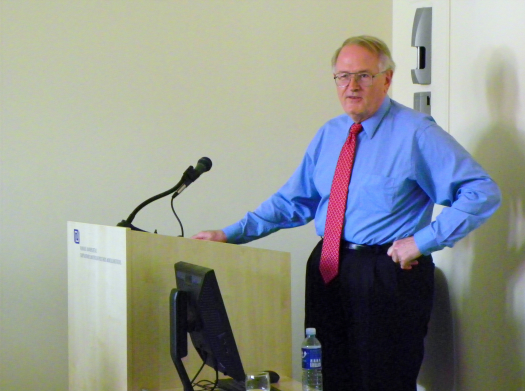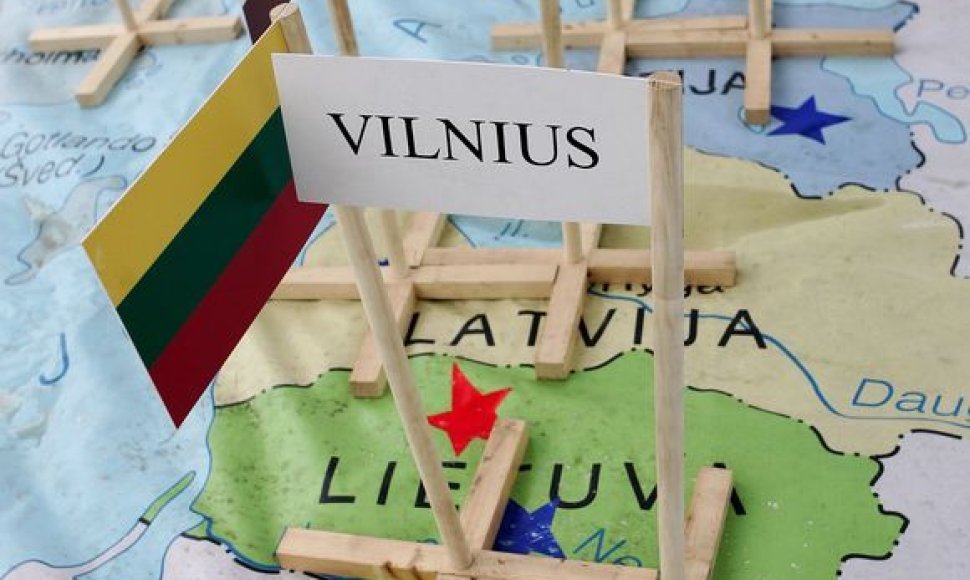Goble, an ethnic affairs specialist, used to work for the Central Intelligence Agency (CIA) and at the United States Department of State, to name a couple of his positions from his long and impressive CV. For someone with his status and experience, Goble is a charismatic, lighthearted person, who is equally aware of the subtleties of politics and how to capture the attention of the crowd.
Interspersing his talk with numerous jokes, anecdotes and highly amusing comments about the world, Goble could very well talk about paint drying and make it sound interesting. Off-handedly revealing that he has leukemia, he begins by showing solidarity about the events of the 13th of January and mentions that the date – his own birthday – “is the only possible day for Westerners from this part of the world to be born.”
 |
| VU TSPMI nuotr./Paul Goble |
After a brief, yet enlightening and witty overview of the use of PowerPoint presentations in the US intelligence community and the state department, Goble has the crowd on the edge of their seats, eagerly waiting for him to continue talking.
“The human brain is so constructed that we will notice change, when we don’t notice the things that stay the same,” Goble points out the obvious, stating that “people will often overstate the meaning of change and ignore the things that are deeper continuities.” The underlying thought is one directly relating to his professional knowledge of ethnicity: political reality requires comprehending the nature of the nations in question.
Goble doesn’t wait around and plunges straight into the mass of information he’s been building up in his mind. He notes that the Russian Federation is a revisionist power, just like the Soviet Union before it: “It doesn’t really accept the normal rules of the game.” Shocking the audience by saying that Russia is falling apart, he argues that it has self-destructive tendencies, fundamental inner contradictions that will come to a head within the next 25 to 50 years.
Russia’s collapse is going to be much worse, both for it and its neighbours, than was the coming apart of the Soviet Union in 1991.
Russia’s collapse “is going to be much worse, both for it and its neighbours, than was the coming apart of the Soviet Union in 1991.” Goble also draws attention to the tendency of revisionist countries to take part in policy activities aimed at gaining quick political return.
The US, he also points out, is in relative decline as well. “We are no longer as important, we no longer have the resources and that has huge consequences,” Goble drives the reality home. There is an increased reliance on international culture as economic and military power decline.
The lecturer accentuates how “we’re going to pay a far higher price for our failures now than we have ever paid before and we, as a country, are angry as hell and don’t know what to do.” What Goble hints at is how the American public is lagging behind the reality of the situation: the US is not as powerful, nor as rich as it used to be.
Goble turns the discussion to the topic of Lithuania. “The first and foremost quality of Lithuania is your openness, which will be your salvation,” he says. The fact that Lithuania as a nation has a character of simple honesty and is welcoming of everyone gives it an advantage, when dealing with Russia. Goble highlights how well Lithuania has integrated itself into Central Europe and that it has the capacity to form a long-lasting country, especially within its framework of religion.
Touching on a controversial topic – Lithuanian-Polish relations – Goble demonstrates his awareness of how “Lithuanians have had, shall we say, a complicated history with the Poles.” Nonetheless, he stresses that the shared history and strong bonds between the two countries should not be ignored; the relationship should be tended to, so it can flourish.
Goble expands his statement about Russia’s grim future by alluding to Voltaire’s observation about the Holy Roman Empire: it was neither Holy, nor Roman, nor an Empire. In the same way, Goble argues that “the Russian Federation is not the Soviet Union, is not Russian and is not a federation.”
After the fall of the Soviet Union, he argues, the population is more ethnically Russian, though not to the extent that Vladimir Putin claims it to be. Goble illustrates that the presence of 15-18 million immigrants from Central Asia and the South Caucasus, combined with low fertility rates and high alcohol-related male death rates among the ethnic Russian population provides the foundation for numerous problems. “It is one solution to the pension problem,” he jokes.
The first and foremost quality of Lithuania is your openness, which will be your salvation.
As a learned man, knowledgeable about numerous different ethnicities and cultures, it is perhaps not surprising that Goble fully backs the principle of national self-determination.
Goble presents a theoretical example of how the US would fare, if it had lost the Cold War, in order to explain the state that Russia finds itself right now. If the American economy had declined as much as the Russian economy did after the collapse of the Soviet Union and then its former arch-foes came in explaining how it should deal with its problems – any such input would be met with indignity. What is surprising, he says, is not that there is so much nationalism in Russia today – it is that there is so little of it.
This also demonstrates why Russia’s political system is as it is: “Eliminating the forces of order is what we did in ’91 and ’92; without putting anything in its place, it guarantees chaos and what does chaos produce? Chaos inevitably produces a demand for order. Vladimir Putin is unthinkable, unless you understand that the Russians don’t want to go through the ‘90s again.”
Continuing the line of thought regarding nationalism, Goble clarifies that “Russia’s tragedy is that the Russian state became an empire before the Russian became a nation and as a result the Russian state has never been a nation state and the Russian people have never been a state nation.”
He continues by dropping a bombshell: “The state has never been the servant of the people, but the other way around and the state has defined who is a Russian, not otherwise.”
After commenting on the poor state of infrastructure in Russia (hyperbolized significance of the Trans-Russian highway; the total length of roads in the largest country in the world being less than that of the lecturer’s home state of Virginia), Goble suggests that there are two ways to manage a country that is ruled from the center to the periphery.
Chaos inevitably produces a demand for order. Vladimir Putin is unthinkable, unless you understand that the Russians don’t want to go through the ‘90s again.
The first approach is the “go out and steal what you can and don’t bother” one, while the alternative is “the Alexander III/Vladimir Putin method, which is 'go out and do what we tell you, or we come in helicopters'.” Goble jokingly comments on the irony of potential rule enforcement via travelling to the problematic area with helicopters, when it would be impossible to do so by driving, since the infrastructure would not allow it.
Goble further highlights how the manner in which a country views its borders expresses the inner relationship between domestic and foreign policies. “Not a single Russian, or at least no group of Russians at any one time since ’91 thinks the Russian borders are where they should be”, he states, further mentioning that “the preferred borders of the Russian Federation, in Russian public opinion, are the borders of the Russian Empire in 1914.”
According to the lecturer, when a country sees the borders of neighbouring countries as being flexible and debatable, the situation becomes very problematic; even more so, if the revisionist country has nuclear weapons.
Goble does not deny the presence of those who would want to reduce the Russian borders. A small segment of the population sees the North Caucasus region as a financial drain on the national budget.
He then turns the talk back towards the US. Remarking once again the relative decline of US economic power, he shines the limelight on two characteristics of American culture.
“The first is,” Goble says, with a hint of a huge smile, “Americans believe geography is irrelevant <…> the United States in the middle, as God clearly intended, surrounded by two large blue bodies of water and a large concentration of foul countries ready to fall. The Cold War was perfect for us.”
“The second aspect of American culture is that for Americans history is irrelevant,” he exclaims, explaining, how it is inconceivable from a US perspective to hold grudges over past events; what was needed was an optimistic outlook towards the future.
The continuation of American culture also shows itself in the need for an enemy, in order to maintain national stability and unity. With the fall of the Soviet Union, Gorbachev took America’s greatest enemy away, making the US lose focus.
Whether or not this resulted in the modern day (relative) decline of US power, it is clear that another enemy was needed: “Now we’re desperate to construct and enemy, which is not appropriately an enemy in the same sense, by using terrorists, which can’t be fought in the same way.”
Americans believe geography is irrelevant <…> the United States in the middle, as God clearly intended, surrounded by two large blue bodies of water and a large concentration of foul countries ready to fall. The Cold War was perfect for us.
Goble winds his lecture down by shifting attention once more to Lithuania. He cites how due to the American floundering economy, Lithuania would potentially gain less support in the future; dealing with Russia would become far more difficult without scaled up backing from the West.
“Cautious engagement,” is the strategy he proposes, also bringing up the changing face of international institutions: “You all wanted to join the old NATO. So did I. I wanted you in the old NATO <…> where there were American bases on the Eastern border.”
“Lithuania is going to find itself, once again, as a small country next to a large revisionist one,” Goble foreshadows.
The prognosis for the future is both grim and optimistic – an oxymoronic amalgam of the adventurous policy trends made by a self-contradictory Russia, a weaker United States that is forced to face its own bleak reality.
Lithuania will be caught in a tough situation, with an ally withdrawing to deal with its own problems and a former adversary aiming to reverse the prophecy of collapse.
What is the best way forward? It would appear that Lithuania’s greatest strength is, as Goble said, its openness and acceptance of everyone. Expanding the positive mindset and welcoming character of the Lithuanian people into the way the country is governed is a possible course of action.
Amiable determination and warm approval are what might just secure the future of the country. Acting humanely in a world governed by politics, while controversial, is a trait that should be preserved, not changed.












